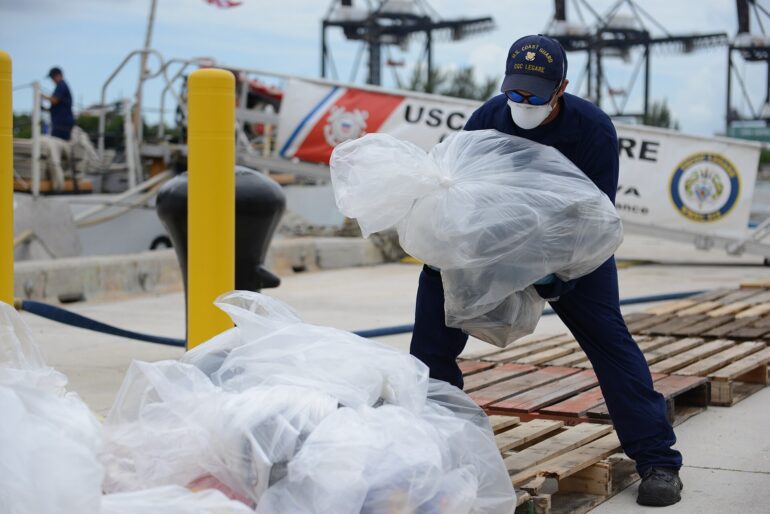Dominican authorities reportedly announced on Sunday the seizure of roughly 1,000 kilograms of suspected cocaine from a speedboat targeted days earlier in a U.S. military strike in the southern Caribbean, describing the action as a landmark in joint anti-narcotics operations with Washington.
At a press conference, officials from the National Drug Control Directorate (DNCD) and the Dominican Republic Navy said they confiscated 377 packages of narcotics about 80 nautical miles south of Beata Island.
The agency said intelligence showed the boat “was loaded with narcotics and was heading to Dominican territory, with the intention of using the country as a bridge to take it to the United States.”
The DNCD underscored the cooperation with U.S. forces, noting the mission was carried out in “close coordination” with the U.S. Southern Command and the Joint Interagency Task Force South. “This is the first time in history that the Dominican Republic and the United States have carried out a joint operation against narcoterrorism in the Caribbean region,” the agency declared in a statement.
The announcement came just two days after President Donald Trump confirmed that American forces had struck the vessel, the third such operation this month.
Trump said the speedboat was traveling along a “known” narcotrafficking corridor and posed a direct threat to American communities. “The strike killed 3 male narcoterrorists aboard the vessel, which was in international waters,” Trump wrote. He emphasized that no U.S. personnel were harmed.
Trump has personally ordered and overseen similar strikes on September 2 and September 15, all part of what the administration describes as a broader campaign to disrupt the flow of cocaine and fentanyl into the United States.
Washington has tied the targeted boats to Tren de Aragua, a Venezuelan criminal syndicate now formally designated as a terrorist organization by the United States. The three operations, according to U.S. officials, have left 17 narcotraffickers dead.
“This is about protecting our citizens from poison,” Trump said Friday, highlighting the national security implications of the narcotics trade.
Venezuelan officials, meanwhile, have pushed back, claiming the September 2 strike hit a civilian vessel. American officials have rejected those assertions, insisting the ships were operated by gangs seeking to exploit the Caribbean’s porous maritime routes.
The strikes have sparked heated debate in Washington, particularly among Democrats wary of Trump’s aggressive use of force. Senators Adam Schiff of California and Tim Kaine of Virginia introduced a resolution under the War Powers Act last week to rein in the president’s actions. “Congress alone holds the power to declare war,” Schiff said in a statement. While conceding the need to block narcotics shipments, Schiff warned that “blowing up boats without any legal justification risks dragging the United States into another war and provoking unjustified hostilities against our own citizens.”
Republicans counter that decisive measures are overdue. Trump’s allies have framed the Caribbean campaign as a long-awaited break from half-hearted interdiction efforts, arguing that the administration is finally treating narcotrafficking as the security threat it is.
For the Dominican Republic, the joint operation has already become a symbol of strengthened cooperation. Officials here called the seizure proof that regional partners can dismantle the routes used to funnel drugs into the United States — if they act forcefully and in unison.
[READ MORE: Harris Memoir Acknowledges Biden’s Age, Missteps, and Her Own Short-Lived Campaign]





